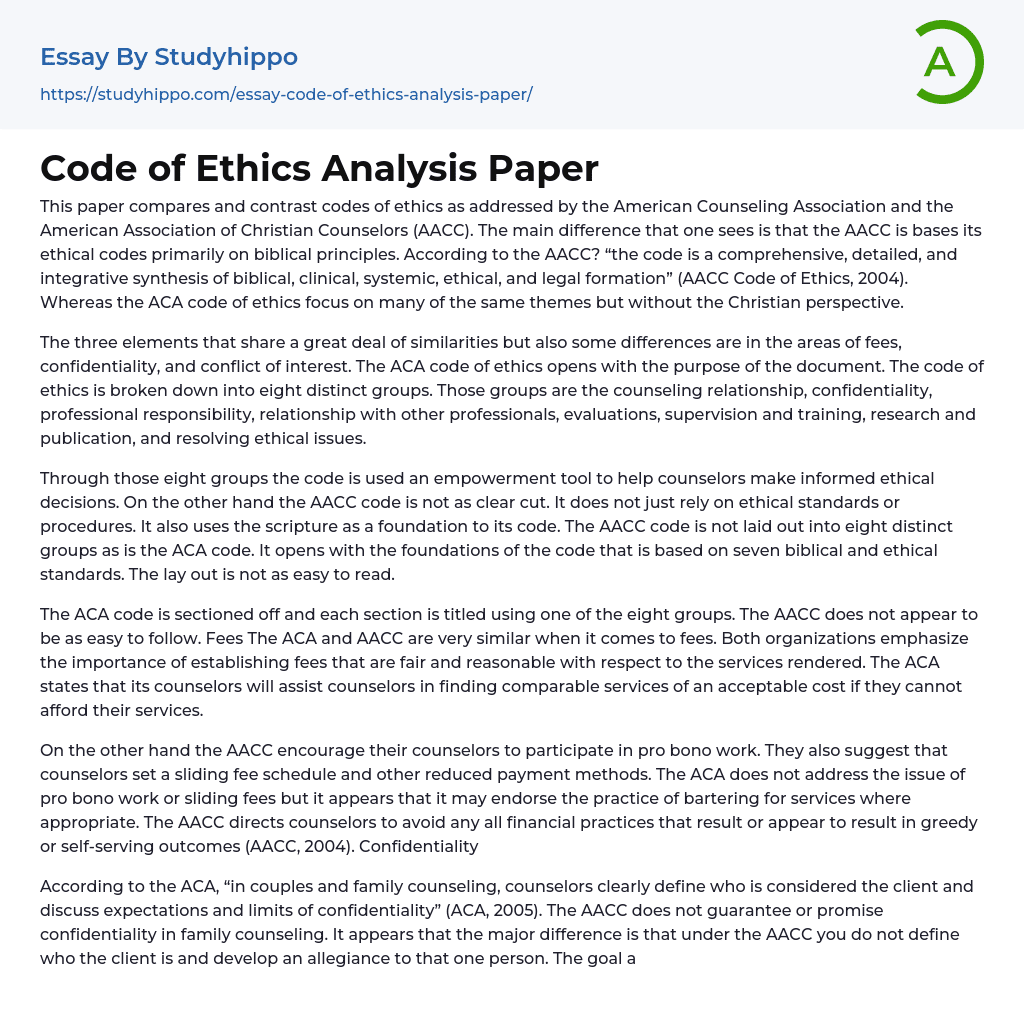This paper compares and contrast codes of ethics as addressed by the American Counseling Association and the American Association of Christian Counselors (AACC). The main difference that one sees is that the AACC is bases its ethical codes primarily on biblical principles. According to the AACC? “the code is a comprehensive, detailed, and integrative synthesis of biblical, clinical, systemic, ethical, and legal formation” (AACC Code of Ethics, 2004). Whereas the ACA code of ethics focus on many of the same themes but without the Christian perspective.
The three elements that share a great deal of similarities but also some differences are in the areas of fees, confidentiality, and conflict of interest. The ACA code of ethics opens with the purpose of the document. The code of ethics is broken down into eight distinct groups. Those
...groups are the counseling relationship, confidentiality, professional responsibility, relationship with other professionals, evaluations, supervision and training, research and publication, and resolving ethical issues.
Through those eight groups the code is used an empowerment tool to help counselors make informed ethical decisions. On the other hand the AACC code is not as clear cut. It does not just rely on ethical standards or procedures. It also uses the scripture as a foundation to its code. The AACC code is not laid out into eight distinct groups as is the ACA code. It opens with the foundations of the code that is based on seven biblical and ethical standards. The lay out is not as easy to read.
The ACA code is sectioned off and each section is titled using one of the eight groups. The AACC does not appear to be as easy to
follow. Fees The ACA and AACC are very similar when it comes to fees. Both organizations emphasize the importance of establishing fees that are fair and reasonable with respect to the services rendered. The ACA states that its counselors will assist counselors in finding comparable services of an acceptable cost if they cannot afford their services.
On the other hand the AACC encourage their counselors to participate in pro bono work. They also suggest that counselors set a sliding fee schedule and other reduced payment methods. The ACA does not address the issue of pro bono work or sliding fees but it appears that it may endorse the practice of bartering for services where appropriate. The AACC directs counselors to avoid any all financial practices that result or appear to result in greedy or self-serving outcomes (AACC, 2004). Confidentiality
According to the ACA, “in couples and family counseling, counselors clearly define who is considered the client and discuss expectations and limits of confidentiality” (ACA, 2005). The AACC does not guarantee or promise confidentiality in family counseling. It appears that the major difference is that under the AACC you do not define who the client is and develop an allegiance to that one person. The goal as a Christian counselor is to explain to the client the difficulty of keeping confidences and the problems and limitations that occur when using this form of therapy.
Conflict of Interest The last item to be explored is the conflict of interest. Both groups have specific rules concerning this situation. The ACA approves of intimate relationships with former clients as long as it occurs five years after the culmination of counseling. Hey go
on to direct the counselor to document whether the relationship could be harmful to the client in some way. They go on to advise the counselor if the relationship could cause harm to the client or its family that the relationship should be avoided.
The AACC forbids any kind of intimacy between a counselor and a former client. They state that the contact is unethical. However, they do allow for marriage between a counselor and former client. The client counselor relationship must have been terminated for at least two years before the counselor should consider marriage. Both groups advocate that the referral of the client initially to another agency should never be done because of a romantic interest and they also both advocate that the relationship should pose no harm to the client or its family.
Conclusion In conclusion it is clear that both boards have guidelines to address issues that counselors face on a daily basis. The codes are very similar in nature with a few differences. It appears that the AACC ethics encompass the guidelines of the ACA ethics but in more detail as it relates to biblical principles. The one true thing in respect to both groups are that the ethic codes are only guidelines. They are not hard fast rules but structured guidelines put in place to help counselors make decisions that are appropriate for the client.
- Values of Life essays
- Ethical dilemma essays
- Normative Ethics essays
- Virtue Ethics essays
- Belief essays
- Deontology essays
- Moral essays
- Virtue essays
- Work Ethic essays
- Code of Ethics essays
- Conflict essays
- Dress Code essays
- Human Resources essays
- Organizational Behavior essays
- Performance essays
- Recruitment essays
- Safety essays
- Acceptance essays
- Age Of Enlightenment essays
- Child Observation essays
- Confucianism essays
- Conscience essays
- Critical Reflection essays
- Destiny essays
- Determinism essays
- Empiricism essays
- Environmentalism essays
- Epistemology essays
- Ethics essays
- Ethos essays
- Existence essays
- Existentialism essays
- Fate essays
- Free Will essays
- Functionalism essays
- Future essays
- Good And Evil essays
- Human Nature essays
- Individualism essays
- Meaning Of Life essays
- Metaphysics essays
- Natural Law essays
- Personal Philosophy essays
- Philosophers essays
- Philosophy Of Life essays
- Political Philosophy essays
- Pragmatism essays
- Reality essays
- Relativism essays
- Teaching Philosophy essays




